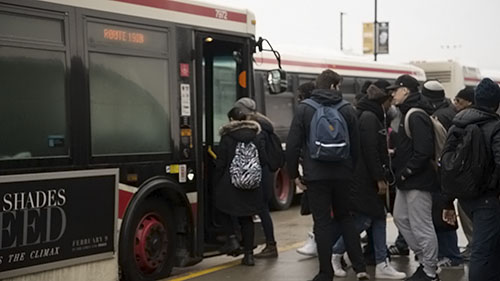
Riders wait to board crowded bus at Humber College’s North campus. (Matthew Frank)
Matthew Frank
Delayed Toronto Transit Commission (TTC) service proved troubling for riders last month when longer than usual delays were reported and there was one incident involving a fight caused by overcrowding at a subway station platform.
After several technical problems on Jan. 30 caused trains to bypass St. George station, commuters were packed into the Yonge-Bloor station during rush hour, according to a tweet by TTC executive director Brad Ross.
The fight erupted between two men on the Museum station platform on the same day and a TTC report concludes “this level of crowding contributed to the reported fight that occurred between the customers.”
The executive director of TTC Riders advocacy group, Shelagh Pizey-Allen said she wants funding to help the TTC improve service and lower fares after a TTC last month didn’t look good, showing a recent drop in ridership resulting in a decrease in fares paid.
“The TTC is underfunded. If the TTC was properly funded, we could offer new ways for people to come downtown,” Pizey-Allen said.
A 10-point plan aims at offsetting the balance to the reduction of transit ridership last year, according to the TTC report.
The report shows ridership decreased by 4.8 million rides from the 543.8 million projected in the 2017 budget.
Whether the improvements will continue to make TTC a priority for transit use, however, remains an important question.
“People cannot afford fare increases every year. We think the TTC needs to be seeking out alternatives,” Pizey-Allen said.
But plans for service improvements are not making any changes for another couple of years.
TTC media relations specialist Stuart Green says automatic train controls will make an impact on overcrowding by 2020.
“The new system will mean the TTC can add six more trains during the day, allowing more people to board than before,” Green said.
For some commuters, however, this may not be soon enough.

Taijean Moodie, Mechanical Engineering student, says he would seek alternative methods of getting around the city. (Matthew Frank)
Taijean Moodie, a Humber student who no longer takes the TTC, says he would avoid crowds through alternative methods to get around the city.
“If I had to take an alternative, I would take Uber instead, if I was late for class. Transit busses are not reliable,” Moodie said.
A separate TTC report indicates morning rush hour ridership on the Line 1 subway reached maximums of between 28,000 and 30,000 passengers per hour.
The report shows the subway is at capacity for 90 minutes every morning.
Humber student Kevin Kosi says he doesn’t mind the overcrowding, feeling as though he can get to his destination on time.
“I don’t really mind overcrowding,” Kosi said.
“When I can get to the place I want to go, I just get there

Humber Student Kevin Kosi says the delays don’t affect his delay commute much. (Matthew Frank)
somehow,” he said.
The need for relief, however, is still growing.
A TTC transit summit on March 3, organized by TTC riders, means to address more plans to relieve some of rider’s already existing pains.
“We have pushed for the two-hour transfer, low income fair passes, and $3 million in base funding,” Pizey-Allen said.
“They are all really big wins, but there’s still so much more to accomplish,” she said.

